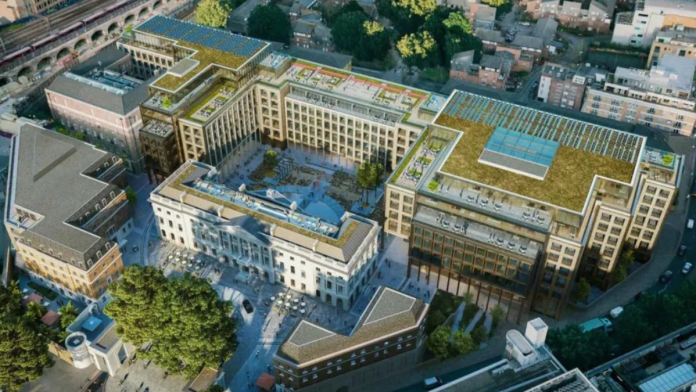Ministers in the UK, including Prime Minister Sir Keir Starmer, have been warned that approving plans for a massive new Chinese embassy in London could be unlawful. Top planning lawyers, including Lord Banner, argue that the project, which is set to cost around £100 million, cannot go ahead without proper scrutiny.
The proposed embassy is planned for Royal Mint Court, a historic site in East Smithfield, close to the City of London and Canary Wharf. It would be the largest embassy in Europe, covering 20,000 square meters, sparking strong opposition from local residents, politicians, and human rights campaigners.
Concerns Over Missing Details in Plans
A key concern is that some blueprints of the embassy’s floor plan have been heavily redacted. Experts, led by Lord Banner, say the missing information makes it impossible to fully assess the building’s safety, structure, and potential uses. They highlight that some parts of the land are protected due to historic listings, which could be affected by construction.
DP9, the consultancy firm representing the Chinese embassy, declined to explain why certain areas, including the basement, were hidden from view. They argued that internal layouts of embassies are different from other buildings and cited a similar approach used in a recent United States embassy project.
Election Interference? Chinese Embassy Linked to Troll Farm Targeting Philippine Officials
However, Lord Banner and other legal advisers argue that the redactions prevent authorities from evaluating crucial details. These include the safety of the structure, fire safety measures, and what the hidden rooms might be used for. They emphasize that planning permission cannot be lawfully granted with incomplete plans.
Diplomatic Immunity Sparks Security Concerns
Another major issue is that parts of the site are intended to remain open to the public. Visitors could see the ruins of a 14th-century abbey and a proposed Chinese heritage center. While the Chinese government has said emergency services could access this area if needed, experts point out that the land would technically be considered Chinese territory.
This means that UK police, including Scotland Yard or the City of London Police, would have limited ability to intervene. Diplomatic immunity would protect embassy staff and the property from UK law enforcement, creating concerns about security and enforcement. Lord Banner warned that promises made by the Chinese government cannot be enforced under UK law, meaning conditions set by planners might not be effective.
The combination of redacted plans and diplomatic immunity has fueled fears that the building could be used for activities beyond the knowledge or control of UK authorities. Some opponents have even described the project as a potential espionage risk, given its proximity to key financial districts and major data centers.
🇺🇸 Visa trap alert — US embassy warns Indians: “Don’t confuse expiry date with I-94 deadline
Planning Inspectors Recommend Approval Amid Controversy
Despite these concerns, reports indicate that the Planning Inspectorate has recommended approval for the embassy. Housing Secretary Steve Reed has been ordered to make the final decision by October.
Local resident groups, including the Royal Mint Court Residents’ Association, have voiced strong opposition, saying that the legal concerns highlighted by Lord Banner make it impossible for the project to move forward without a serious risk of judicial challenge. Shadow Justice Secretary Robert Jenrick also stated that he would support a judicial review if the embassy plans are approved.
The Chinese government has defended the plans, dismissing claims of espionage or other hidden agendas. A spokesman described criticism as slander and insisted the embassy project is being carried out transparently.
Government departments, including the Ministry of Housing, Communities & Local Government, have so far declined to comment on the matter.


